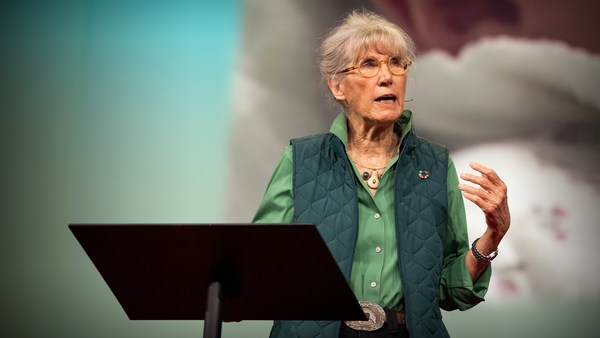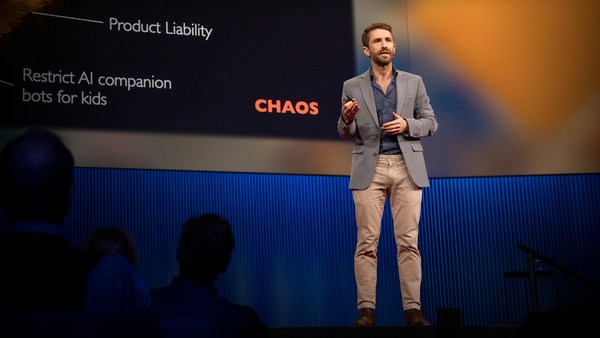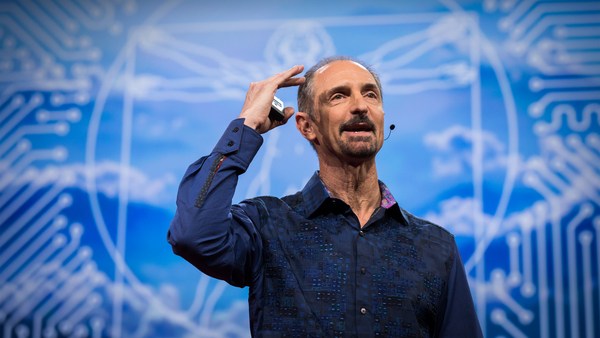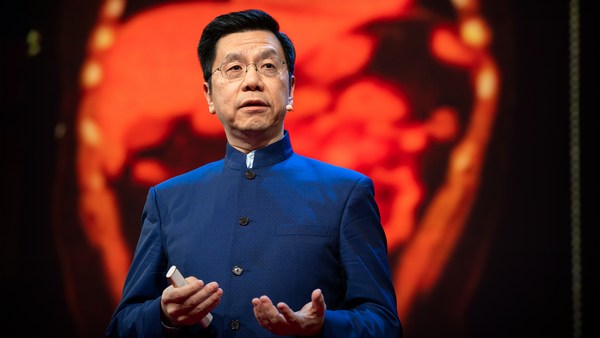So it's a Tuesday afternoon and I'm in my home office, working on a tricky product design. I have my headphones on and I'm in my groove.
Just then, one of those annoying dings cuts through my Do Not Disturb. So it's someone important. It's Rosa, our nanny. "Hey, Avni, I was wondering if I could take next Friday morning off." I silence it, I'll just get back to her a little bit later.
I realize I need something for my email so I head mindlessly to my inbox. Big mistake. There are not one, but six basketball emails, rehearsal and a field trip. That's OK, I've got remarkable self-restraint and I leave them unread. I also activate my really foolproof system of telling myself not to forget.
(Laughter)
I grab my email and I get back to work. Two more minutes, another ding. It's Rosa again. "Hey, Avni, I'm at the school for pickup, but there's no one here. Should I be somewhere else?"
Immediately, monkey brain activates. I grab my phone, "What day is it? What time is it? Today’s play rehearsal, right? That should be at the big gym." I head back to my email, looking through all of the rehearsal emails, costumes, volunteering and there, on the schedule for today, at the bottom, "Oh, by the way, today's in the music room."
I text Rosa and tell her to head to the other side of the school, and I sit back, relieved, and my eyes fall on those unread emails. And I think, you know what happens next. I finish that product doc, obviously.
(Laughter)
Yeah, no. I'd like to tell you that this is the exception, but I ended up creating an AI company because it wasn't. Because with two kids, two jobs, and your modern family cocktail of crazy-hair days and soccer tournaments and misplaced library books, I loved how full our life was, but I hated that somehow my brain had become the computer that ran my family.
And worse, it made collaboration nearly impossible because everything was in my head, and the only way to get it out of there was to ask me. At which point I would look to my husband and say, when was it that I became his project manager? Pro tip: not a very good way to handle human relationships.
(Laughter)
But maybe it's because I've been a scientist and a product designer before I became a tech founder, that next to that frustration, I also felt curiosity and opportunity. I had honed my ability to find the tiniest bits of friction in everyday interactions, and to build products that solve them, like packaging for an osteoporosis drug that was both child-resistant and accessible to arthritic hands. Or designing a service for parents to connect to sitters and doing it over SMS because that's where they already are instead of sending them to another app.
And this, parenthood, well, this felt like the friction Olympics. I wanted to build myself a force field, a machine that could intercept every interruption, an expert that was more capable and organized than I could ever be. I mean, if we were going to use my brain as a computer to run it all, why couldn't we use an actual computer instead?
My first few tries failed. It didn't matter how meticulously I entered every last detail of our family's logistics, there was always some situation or scenario I would fail to detail. I mean, try explaining a five-year-old's sudden allergy to square-shaped foods to software.
(Laughter)
But then three years ago, things changed. Large language models started to get really good. And unlike software, AI could handle ambiguous and incomplete information. It could take something like a birthday party invite and not just do the explicit thing, like get it into my calendar, but handle the implicit things that too often mess tired, busy parents up, like reminding me to buy a birthday present or checking for conflicts.
So now, when my husband and I are hit with something related to the family, I've built Milo, the first AI sidekick for parents, to be able to take those school newsletters and grocery items and library books and be able to handle it. And best yet, Milo can tell everyone what's happening every day. Finally, a computer that can actually run things.
So you'd think that this is where the story ends. But no. Because I'm human and I'm greedy. If Milo could take on the rote, repetitive, administrative parts of family life so beautifully, why not keep on going? Why couldn't it coordinate playdates with Sienna's mom, Carrie? Or when the girls were bickering, pop in to suggest the ideal way to resolve their dispute?
So a couple of months ago, we're working on ways to improve this force field and one of my investors, a guy who's pretty reserved unless you get him fired up, goes, "Well, Milo can see those evening events and just automatically text your sitter. Or it knows your friends' birthdays and it can just send them birthday wishes. And those teacher emails? Well, Milo can just connect directly to your inbox and suck every last one up so you never have to see another one again."
As we fleshed these features out, though, something just didn't feel right, but I couldn't figure out what it was. After all, I was looking for friction and finding ways to eliminate it, but something just didn't feel right. What was it?
That question nagged me for weeks until one evening my daughter Saaya ran into the kitchen to show me something she had made in art class. And as I ran my fingers over those tiny clay pieces, it hit me. Not all friction is bad.
You might know, to connect two of these clay pieces together, you actually have to score each side haphazardly so that they have something to grip on to. Otherwise the smooth sides just slide past one another. This resistance is called productive friction, and it's valuable because it creates connection.
And where people are involved, there's lots of productive friction, meaningful interactions disguised as inefficiencies. I didn't need a perfectly solid force field. I needed a permeable one instead. One that shielded me from the things that I found unproductive, but let in the fewer, messier, more meaningful ones for me to handle.
Milo could find three times that worked for the playdate, but I could text Carrie, which would give me a chance to ask her about her mother. Or Milo could comb through every last detail of that school newsletter, picking out details that my eyes might miss but leave for me on top Miss V's note about how our daughter Arya’s creative writing has really been blossoming.
You might draw your line in a different place, and that's OK. And I might draw mine differently under different circumstances. In a week when my husband is traveling and our nanny is sick, the girls have tennis tryouts and I have a product launch, I want Milo to build me a force field you could see from space.
(Laughter)
But I guess the point is, we finally have the kind of technology that can tell the difference between load that we need help lightning and work that is hard, but that is mine to do.
I've begun to realize that one of the most radical things AI can do for us is not do the things for us faster and better, but to push us to choose what is most meaningful and then make the space for us to do it ourselves.
This feels like a brave new world, but I'm excited to see what is possible when we have tools that encourage us not to be more perfect and productive, but unfinished and evolving. That reminds us not to be afraid to bear the friction, that just shows us how we are all beautifully, imperfectly, inconveniently human.
Thank you.
(Applause and cheers)





